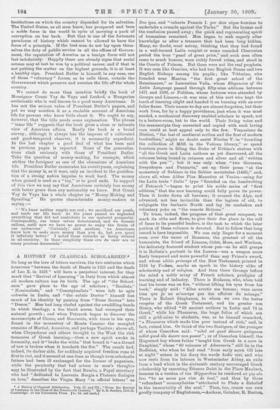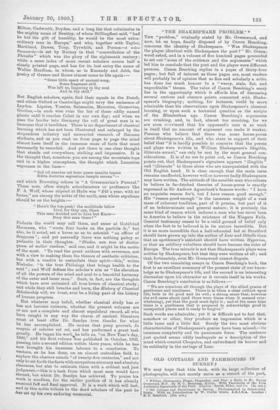A HISTORY OF CLASSICAL SCHOLARSHIP.*
-So long as the love of letters survives, the two centuries which intervene "between the death of Dante in 1321 and the death of Leo X. in 1521" will have a perpetual interest, for they mark that "Revival of Learning" in Italy from which almost All modern culture has its birth. The age of "the School- men" gave place to the age of scholars ; "Realists," -" Nominalists," and "Conceptualists " were left to spin -cobwebs in limbo, and "the subtle Doctor" himself lost much of his identity by passing from "Duns Scotus" into -"Dunce." Men bad long chafed against the swaddling-bands in which theology, a too timid nurse, had cramped their anitural growth ; and when Petrarch began to discover the manuscripts of Cicero, and Boccaccio, with tears in his eyes, found in the monastery of Monte Cassino the mangled remains of Martial, Ausonins, and perhaps Tacitus; above all, -when Chrysoloras and others brought to the West the rich 'treasures of Greek learning,—then a new spirit awoke in 'humanity, and it" brake the withs" that bound it "as a thread of tow is broken when it touolleth the fire." The result had, indeed, its darker side, for suddenly acquired freedom runs at first to riot, and it seemed at one time as though even scholastic fetters had been ill exchanged for the license of paganism, while the perplexity that bad arisen in men's thoughts may be illustrated by the fact that Bembo, a Papal secretary who had "dedicated to Lucrezia Borgia a Platonic dialogue on love," describes the Virgin Mary "in official letters" as • A Misters of Classical Scholarship. Vols. IL and In., "From the Revisal of Learning to the Close of the Ninatec+Ith Century." By J. E. filandys; Litt.D. "Cambridge : at the University Press. Di. 6d. net eaella Dea ipsa, and "exhorts Francis I. per deos atque homines to undertake a crusade against the Turks." But the license and the confusion passed away ; the quick and regenerating spirit of humanism remained. Men began to seek eagerly after knowledge as after a treasure that had been long hidden. Many, no doubt, went astray, thinking that they had found in a well-turned Latin couplet or some rounded Ciceroni= period the true "pearl of great price," and such men often came to much honour, wore richly furred robes, and stood in the Courts of Princes. But these were not the real prophets. It was men like Guarino, who had two English Deans and two English Bishops among his pupils ; like Vittorino, who founded near Mantua "the first great school of the Renaissance," or Laurentius Vella, whose Elegancies of the Latin Language passed through fifty-nine editions between 1471 and 1536, or Politiau, whose lectures were attended by Grocyn and Linaore,—it was men of this sort who kept the torch of learning alight and banded it on burning with an ever fuller flame. Their names to-day are almost forgotten, but their work lives, for by a happy providence, just when it was most needed, a mechanical discovery enabled scholars to speak, not to a lecture-room, but to the world. Their living voice and the manuscripts they corrected and copied with such loving care could at best appeal only to the few. Vespasiano da Bisticci, "the last of medireval scribes and the first of modern booksellers," might no doubt assist Nicolas V. in "founding the collection of MSS. in the Vatican library," or spend fourteen years in filling the Duke of Urbino's shelves with "all the Greek and Latin authors as yet discovered, all the volumes being bound in crimson and silver and all written with the pen' " ; but it was only when "two Germans, Sweynheym and Pannoxtz," set up their press "at the monastery of Subiaco in the Sabine mountains (1465)," and, above all, when Aldus Pius Manutius at Venice—using for the Latin texts "Italic" type "founded on the handwriting of Petrarch "—began to print his noble series of "first editions," that the new learning could fully prove its power. Then it broke down all barriers; it crossed the Alps, and advanced, not less invincible than the legions of old, to subjugate the barbaric North and lay its unshaken and voluntary yoke on "the remote Britons."
To trace, indeed, the progress of that great conquest, to mark its ebbs and flows, to give their due place in the roll of fame to its peaceful leaders, is the task to which the later portion of these volumes is devoted. But to follow that long record is here impossible., We can only linger for a moment even over the name of Erasmus, the greatest of all the humanists, the friend of Linacre, Colet, More, and Waltham, the delicately featured student whose pen—as be still grasps it in Holbein's portrait in the Louvre—was a weapon more finely tempered and more powerful than any Prince's sword, and whose editio princeps of the New Testament, printed in 1516 by Froben, marks an epoch in the history alike of scholarship and of religion. And then there throngs before the mind a noble array of French scholars, prodigies of learning and of industry. There is Budaeus, who, when told that his house was on fire, "without lifting his eyes from his book," simply said: "Allez 'tiredly ma female; vous saves hien quo je no in'occupe pas des affaires du menage." There is Robert Staphanus, to whom we owe the text us receptus of the Greek Testament, and his greater son Henry, who edited "58 ancient authors in Latin and 74 in Greek," while his Thesaurus, the huge folios of which are still a gold-mine to students, was, as he himself remarked, "a Thesaurus which made him poor instead of rich," and, in. fact, ruined him. Or think of the two Scaligers, of the younger of whom Casaubon said: " nihil eat quod discere quisquam vellet quad lb docere non posset" ; or of Casaubon himself, the Auguenot boy whose father "taught him Greek in a cave in Dauphine," whose "60 volumes of Adversaria" still lie in the Bodleian, who when he had read "from early morn till late at night" enters in his diary the words hodie vicci, and who now rests from his labours in Westminster Abbey, an exile from a land which in the sixteenth century encouraged Greek scholarship by executing Etienne Dolet in the Place Maubert, because in a version of the Hipparehus lie rendered ø'é yAp oic t a-et "tu no seraa pas rien de tout," and thus by three "redundant" monosyllables "attributed to Plato a disbelief in the immortality of the soul." Then, too, comes our own goodly company of Englishmen,---Ascham, Gataker, R. Barton,
Milton, Cudworth, Dryden, and a long list that culminates in the mighty name of Bentley, of whom Stillingfieet said, "had he but the gift of humility, he would be the most extra- ordinary man in Europe," and who, together with Taylor, Markland, Dawes, Toup, Tyrwhitt, and Porson-6 mire Oaeaturviic—is set by Burney in that "constellation of the .Pleiades" which was the glory of the eighteenth century ; while a mere index of more recent scholars covers half a Closely printed page, and has for its last entry the name of Walter Headlam, in whom, as in Kennedy and Jebb, the Poetry of Greece and Rome almost came to life again:—
. "Some little spark of ancient song,
Some fragment still
'Was left us, lingering in thy soul And in thy skill."
But English scholars, again, find their equals in the Dutch, and either Oxford or Cambridge might envy the eminence of Leyden. Lipsius, Vossius, Salma,aius, Meursius, Gronovius, Grotius,—in such wise runs the list of these oddly named
giants until it reaches Cobet in our own day; and when we pass the border into Germany the roll of great men is so immense that it bewilders. There is no department of classical learning which has not been illustrated and enlarged by the stupendous industry and unwearied research of German students, and as you read on from page to page the mind almost loses itself in the immense mass of facts that must
necessarily be recorded. And yet there is one clear thought that stands out everywhere, striking and impressive, It is the thought that, somehow, you are among the mountain-tops and in a higher atmosphere, the thought which Lucretius expresses in the lines-
" Sod nil suavius set bone quam munita tonere Edits, doctrina sapientum tompla serena "- and which Browning echoes in "A Grammarian's Funeral." These men, often simple schoolmasters or professors like
P. A. Wolf, whose stipend at Halle was "£45 a year, with no house," are among the noble of the earth, men whose sepulture should be on the heights :—
"Here's the top-peak I the multitude below Live, for they can, there
This man decided not to Live but Know— Bury this man there P"
Pedants the world may call them, and sneer at Gottfried Ilermann, who "wrote four books on the particle Ile," but also, be it noted, sat a horse so as to astonish "an officer of dragoons " ; and yet assuredly there was nothing paltry or pedantic in their thoughts. " Studeo, non tam ut doctior Qum ut melior evadam," said one, and it might be the motto of the most. "To read the great authors with reverence, not With a view to making them the themes of aesthetic criticism, but with a resolve to assimilate their spirit—this," writes Niebuhr, "is the true Philology that brings health to the soul " ; and Wolf defines the scholar's aim as "the elevation of all the powers of the mind and soul to a beautiful harmony of the outer and inner man." Such, in fact, are the thoughts Which have ever animated all true lovers of classical study ; and while they still breathe and burn, the History of Classical
Scholarship will, we trust, ever be a living part of the history of human progress.
But whatever may befall, whether classical study has or has not become outworn, whether the present volumes are or are not a complete and almost sepulchral record, all who have caught in any way the charm of ancient literature must at least offer Dr. Sandys true thanks for what he has accomplished. He scorns that puny proverb, In mognie et voluisse sat eat, and has performed a great task
greatly. He began his work-bbe tells us, "on New Year's day, 1900," and his first volume was published in October, 1903, Passing into a second edition within three years, while he has now brought his immense labours to a conclusion. To venture, as he has done, on an almost untrodden field, to explore the obscure annals "of twenty-five ceuturies," and not
only to set forth the facts with scrupulous accuracy and absolute clearness, but also to estimate them with a critical and just judgment,—this is a task from which most men would have .shrunk, but which Dr. Sandys has achieved. To praise his
work is needless, for the earlier portion of it has already received fuli and final approval. It is a work which will last,
and in this noble tribute to the dead scholars of the past he las set up his own enduring memorial.

























































 Previous page
Previous page